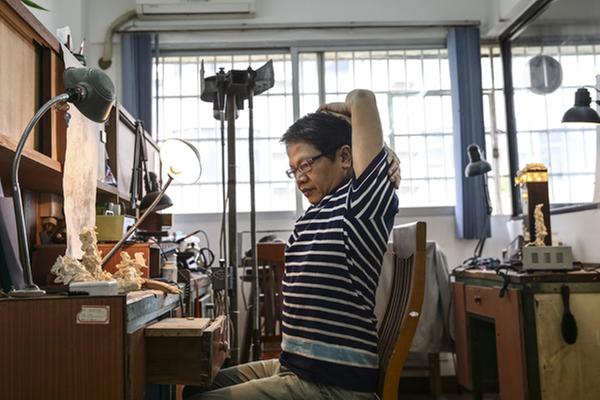Carvers make a lifetime's commitment to their art
By Yang Wanli | China Daily | Updated: 2017-05-22 08:01
 |
| A member of staff at work at the Guangzhou Daxin Ivory Carving Factory.[Photo by Zou Hong/China Daily] |
However, the low income is of less concern to Guo than a national ban on the ivory trade that will come into force at the end of the year. "My worry is not about losing my job. I am still young enough to start a new career, but our craftsmanship has no chance of surviving," he said.
"In many jobs, eight years seems a long time, but in ivory carving, it's just the start. All seven of us have stuck with this career for nearly a decade and we really want to gain a deeper understanding of these skills, which are now on the verge of extinction."
Guo isn't the only craftsman who feels helpless in the face of the forthcoming national ban on ivory trading.
"Leaving aside the question of the future, if no policy is devised to save this dying art, it may be impossible to repair ancient art works in a few decades," said Geng Boling, who has practiced ivory carving for 46 years, and has worked as a repairer of artifacts at the Palace Museum in Beijing since 2014.
In the past three years, Geng has repaired ivory pieces from the Ming (1368-1644) and Qing dynasties (1644-1911). "That's the highest level of artistic achievement - the acme of perfection," he said.
However, a lack of elephant tusks and the loss of a number of traditional skills means the repair of large artifacts has been suspended indefinitely. Every time he looks at masterpieces made hundreds of years ago, Geng envies the old masters who devoted their entire lives to the craft.
"Life is not a fairy tale where all dreams come true," he said. At 63, he is no longer concerned about whether his skills will feed his family, so he has chosen to accept that ivory carving is doomed.
"For the development of society, it's just one of thousands of ways of earning a living and is relevant to very few people," he said. While he agrees that elephants should be protected, Geng doesn't want to see all ivory outlawed.
Exploitation and extinction
"Overexploitation of ivory will result in elephants becoming extinct, but artists should be allowed to use ivory from elephants who have died of natural causes, and pass their skills and experience onto the next generation," he said.
Even if the use of ivory were outlawed completely, the artisans could still work with jade, wood, bull's bones and even mammoth tusks, but few would make the choice.
Zhang, the factory director, said ivory has perfect hardness, somewhere between wood and jade, which makes almost all shapes, such as tiny petals and leaves possible. It can even be fashioned into stripes as thin as instrument strings.
The best illustration of ivory's unique nature is a sleeping mat used by the Empress Dowager Cixi of the Qing Dynasty, which was woven from very thin, soft strips of ivory and is as flexible as wicker, according to Zhang.
























